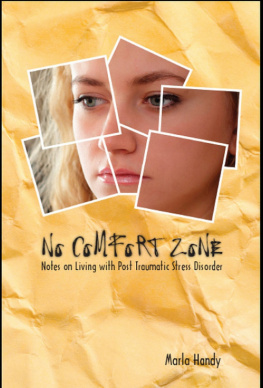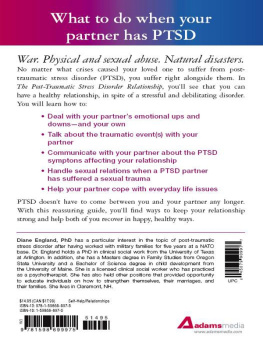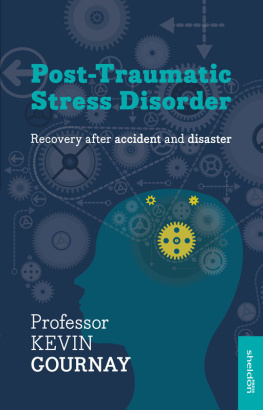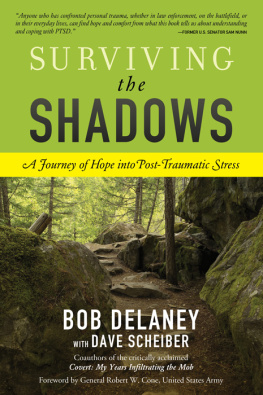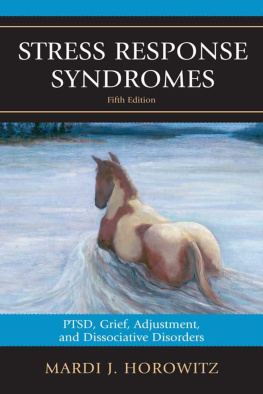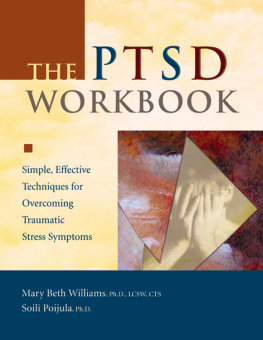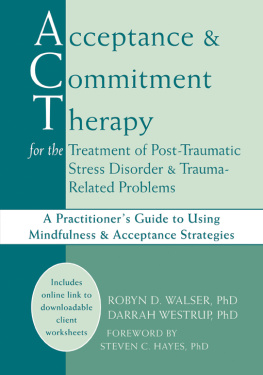First published 2014 by Left Coast Press, Inc.
Published 2016 by Routledge
2 Park Square, Milton Park, Abingdon, Oxon OX14 4RN
711 Third Avenue, New York, NY 10017, USA
Routledge is an imprint of the Taylor & Francis Group, an informa business
Copyright 2014 Taylor & Francis
All rights reserved. No part of this book may be reprinted or reproduced or utilised in any form or by any electronic, mechanical, or other means, now known or hereafter invented, including photocopying and recording, or in any information storage or retrieval system, without permission in writing from the publishers.
Notice:
Product or corporate names may be trademarks or registered trademarks, and are used only for identification and explanation without intent to infringe.
Library of Congress Cataloging-in-Publication Data:
Hautzinger, Sarah J., 1963
Beyond post-traumatic stress: homefront struggles with the wars on terror / Sarah
Hautzinger and Jean Scandlyn.
pages cm
Includes bibliographical references and index.
ISBN 978-1-61132-365-8 hardback
ISBN 978-1-61132-366-5 paperback
ISBN 978-1-61132-367-2 institutional eBook
ISBN 978-1-61132-733-5 consumer eBook
1. Post-traumatic stress disorder. 2. Post-traumatic stress disorderPatients
United States. 3. VeteransMental healthUnited States. 4. Iraq War, 20032011
Psychological aspects. 5. Afghan War, 2001Psychological aspects. 6. War on
Terrorism, 20012009Psychological aspects. I. Scandlyn, Jean. II. Title.
RC552.P67H38 2013
616.8521dc23
2013036337
ISBN 978-1-61132-365-8 hardback
ISBN 978-1-61132-366-5 paperback
Cover Image: Glory Girl by Laura BenAmots,
from Battle Portraits Series (battleportraits.com).
Cover design by Lisa Devenish
Text design by Margery Cantor
W hen soldiers return to the United States from the wars in Iraq and Afghanistan, they bring more than medals, battle stories, and visible wounds with them. The unseen effects from their experiencescombat stress and moral injuries, depression and suicide, substance abuse, and higher propensities for violenceripple through the lives of combat veterans, their families, friends, and wider communities for years to come. Ideally, as part of processing all this, conversations and stories ripple outward as well. Stories, yes, about patrols and hits and battles in theater, as soldiers call the places to which they deploy. But just as important to hear are stories about what happened relatively off-stage, at home, about sacrifices made, about discovering new breaking points, and about mustering new strengths. This book chases those ripples, following the journey of a team of anthropologists over four years of fieldwork.
As ethnographers, we undertake writing a kind of history in the making, a local story of soldiers coming home from war zones, and therefore inflected by regional, national, and global forces. We ask how those struggling after deployments are understood, both institutionally and in community, and give special attention to frameworks like combat stress and post-traumatic stress disorder (PTSD). In turn, we follow ways in which these effects radiate outward, drawing the community into their complexities.
We cannot stress enough how early it feels to attempt a written, collective accounting of how these wars play out at home. They are, after all, wars that in some sense are still unnamed, meaning that they probably still do not hold the names that history will eventually bestow as we settle into consistent usage (as with WWI and WWII settling long afterward). In this books subtitle we refer to the Wars on Terror, a slight alteration of the militarys GWOTthe Global War on Terror. For many Americans, the wars official title appears to sit uncomfortably; it is not used in everyday speech. Naming a war GWOT may encapsulate some of the problematic open-endedness of fighting against terror, which is both a tactic and an emotion. The subtitle Homefront Struggles with the Wars on Terror, in the plural, captures some of the instability surrounding the very naming of the wars. In the rest of the volume we opt for a more neutral, perhaps place-holding term, calling them the post-9/11 wars. Military personnel use OEF/OIF to refer to the Afghanistan and Iraq wars jointly (OEF refers to Operation Enduring Freedom in Afghanistan, OIF to Operation Iraqi Freedom in Iraq). Writing in and about the present and recent past, we recognize, places inevitable blinders on our vision. How will history look back on the United States during the period of the post-9/11 wars? Will we be narrated as a martial force that took stands for the freedom that most American service members say they fight for? And what will be meant by freedom? Freedom to civil liberties, rule of law, and democracy? Freedom from terrorism, at any cost? Will we be narrated as championing greater global security and global freedoms? As enforcing the prerogatives of global empire?
After a decade of deeply controversial conventional warfare, the United States currently exercises more surgical (drone-driven) means of taking out adversaries believed to be terrorists. Many see surgical strikes as an alternative that should have been pursued in the first place, but they raise their own problems, not least that they are now increasingly used across multiple international borders. In the past decade, military, security, and intelligence sectors have easily tripled. Most tellingly, we write from a time and place where, while endless reporting and official diplomatic discussions are ongoing, much of this is not talked about directly, in American communities. Instead, in 2013, while the wars stretch in diffuse ways into the future and even as the United States is out of Iraq and drawing down in Afghanistan, most of the local stories we tell are about how we cope with the challenges war has brought to us and ours. How veterans come home, then, is at the heart of civilians experience of war itself.
At the beginning of this project, we half-jokingly declared that we didnt want to venture into this research without a clear exit strategy (the military metaphors were rife from the beginning). But as can happen, the work expanded, both because of what occurred through our relationship with the army, and because of the nature of ethnography itself. Team members volunteered at Army Community Services and the USO (United Service Organization) facility at Fort Carson, interviewed spouses in their living rooms, volunteered on art projects designed to build community, and attended support groups for spouses and town hall meetings. Those opposed to these wars and to processes of militarization have had their hearing, as well, as we have attended meetings and protests against the war and the armys new helicopter brigade and its proposed expansion of training grounds in southeastern Colorado. Ethnography, the writing of in-depth interpretations of people or culturesor in this case, a large social institutionis expansive in nature. It is the opposite of sound-biting; instead, it is thickening the description, complicating the questions we ask. The stories in this book move across many sites and contexts, drawing upon interactions circling from homes to battlefields to returning back home again. They unfold in the wake of repeated deployments, as families and communities welcome back profoundly changed individuals. By actively pluralizing the voices in the conversation, our hope is to offer a new framework with which to reckon wars impact.




